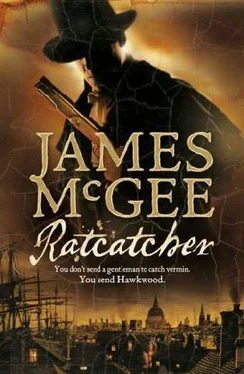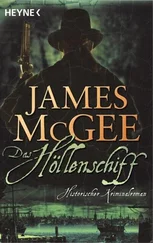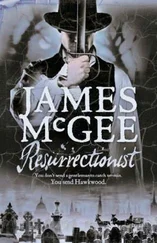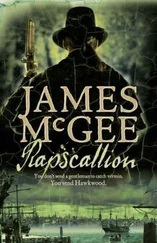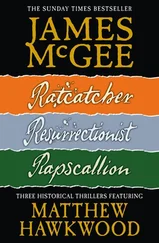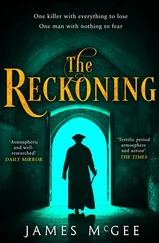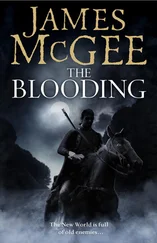James McGee - Ratcatcher
Здесь есть возможность читать онлайн «James McGee - Ratcatcher» — ознакомительный отрывок электронной книги совершенно бесплатно, а после прочтения отрывка купить полную версию. В некоторых случаях можно слушать аудио, скачать через торрент в формате fb2 и присутствует краткое содержание. Жанр: Исторический детектив, на английском языке. Описание произведения, (предисловие) а так же отзывы посетителей доступны на портале библиотеки ЛибКат.
- Название:Ratcatcher
- Автор:
- Жанр:
- Год:неизвестен
- ISBN:нет данных
- Рейтинг книги:4 / 5. Голосов: 1
-
Избранное:Добавить в избранное
- Отзывы:
-
Ваша оценка:
- 80
- 1
- 2
- 3
- 4
- 5
Ratcatcher: краткое содержание, описание и аннотация
Предлагаем к чтению аннотацию, описание, краткое содержание или предисловие (зависит от того, что написал сам автор книги «Ratcatcher»). Если вы не нашли необходимую информацию о книге — напишите в комментариях, мы постараемся отыскать её.
Ratcatcher — читать онлайн ознакомительный отрывок
Ниже представлен текст книги, разбитый по страницам. Система сохранения места последней прочитанной страницы, позволяет с удобством читать онлайн бесплатно книгу «Ratcatcher», без необходимости каждый раз заново искать на чём Вы остановились. Поставьте закладку, и сможете в любой момент перейти на страницу, на которой закончили чтение.
Интервал:
Закладка:
“Clocks?” The Chief Magistrate stared at Hawkwood aghast. “Clocks? Do you seriously think that’s what this is about-the design for some newfangled timepiece? Good grief, man, if only it were that simple!” Without further explanation, the Chief Magistrate turned towards the door. “MR TWIGG!”
The door opened almost before the summons was out of the magistrate’s mouth.
“Sir?” Ezra Twigg blinked and waited for his instructions.
Read reached for a pen and wrote quickly on a sheet of notepaper. Folding the paper and sealing it, he wrote an address and handed it to his clerk. “You are to deliver this posthaste, Mr Twigg. You’ll note that Caleb is waiting outside. Be so good as to inform him there will be two passengers. We’ll be down directly.”
Spurred by the urgency in the magistrate’s tone, Twigg nodded. “Yes, sir. Right away.”
As the clerk scampered out of the office, the Chief Magistrate reached for his cane.
“Why wasn’t I told?” Hawkwood tried to keep his voice calm.
The Chief Magistrate paused. “Told what?”
“What was in the pouch. You knew what the contents were when you assigned me to the case. Why didn’t you tell me that’s what they were after all along? The passenger’s valuables were a diversion. You knew that.”
“I thought it was a possibility. There was always the chance it was a simple highway robbery and, if that was the case, there was no point drawing unnecessary attention to the dispatch pouch or its contents. But enough of this, we’re wasting time.”
“You should have trusted me,” Hawkwood said.
The magistrate’s head came up swiftly. There was a flash of annoyance in his eyes. “For what it’s worth, Hawkwood, I do trust you. Keeping you in ignorance was not my choice. My hands were tied. However, if you want to find out the true facts behind this case, I suggest you rein in your vexation and come with me.” Without waiting for a response, the Chief Magistrate turned and hurried out of the room.
Hawkwood swore under his breath. If it wasn’t about clocks, what the hell was it about? And, more to the point, how in God’s name had the proceeds of the coach robbery ended up in Warlock’s possession? None of it made any sense.
It wasn’t until he heard Read give the waiting coachman his instructions that he learned their destination. Which made even less sense.
The Admiralty Building, Whitehall.
12
Hawkwood closed his eyes and wondered what the punishment was for throttling an Admiralty clerk. The continuous scratching of nib across paper had become a kind of torture, like the insistent buzzing of a wasp trapped against a window pane.
The cause of Hawkwood’s irritation, a lieutenant who didn’t look a day over sixteen, was not unaware of the effect his labours were having. During the last ten minutes, on each occasion the lieutenant had dared lift his head to take a surreptitious peek at the tall, grim-faced man seated on the bench against the opposite wall, his perusal had been met and returned with such brooding intensity that he had been forced to lower his eyes quickly lest he be turned to stone by the basilisk stare.
It was thus with considerable relief that the lieutenant responded to the jangling of the admiral’s bell. He looked up briefly. “You may enter.”
Hawkwood stood and eased cramped muscles. He had begun to wonder if the Chief Magistrate had forgotten him. Since their arrival at the Admiralty offices and Read’s disappearance through the doors of the Board Room, with instructions to wait until sent for, Hawkwood had been left to cool his heels. Only the indistinct murmurings, barely audible beyond the closed doors, had persuaded him that his presence might still be required.
Composing himself, he opened the door.
Aside from the Chief Magistrate, there were three men in the room. Hawkwood did not recognize any of them. James Read beckoned him forward. “Come in, Hawkwood. These gentlemen are anxious to make your acquaintance. Allow me to present Sir Charles Yorke, First Lord of the Admiralty. His fellow board members, Admiral Dalryde and Inspector General Blomefield. Gentlemen, Officer Hawkwood.”
Anxious, maybe, Hawkwood thought, but not overly happy at the prospect, if their expressions were anything to go by.
The First Sea Lord’s face was as dark as a thundercloud, though it could have been the subdued lighting that had manufactured that effect. The admiral, seated behind the long table, was looking at Hawkwood the same way he might have regarded something he’d picked up on the sole of his boot. Of the three, only Inspector General Blomefield showed what might have been a hint of genuine interest. There was something else in the man’s gaze, Hawkwood sensed. If he didn’t know any better, he’d have sworn it was amusement.
Hawkwood’s eyes were drawn to the table and the two sketches that lay upon it.
The First Sea Lord threw an accusatory glance at James Read. “Does he know?”
Read shook his head. “Not yet.”
“Perhaps it’s time I did,” Hawkwood said. He’d had enough of being kept in the dark.
The admiral’s head came up quickly. Charles Yorke grimaced. “By God, Read, you breed impudent pups!”
Before James Read could respond, Blomefield spoke. “Actually, I’d say the fellow has a point, under the circumstances. Wouldn’t you, Sir Charles?”
There was an uneasy silence. Hawkwood felt the eye of the First Sea Lord upon him, sensed the displeasure at the apparent disrespect for authority.
After several moments, and somewhat grudgingly, the First Sea Lord finally nodded. “Very well, Read. I suppose you’d better tell him.”
Before the Chief Magistrate could respond, however, there came a sharp tap on the Board Room door. The door opened. The admiral’s clerk stood on the threshold. The lieutenant opened his mouth, but he was given no chance to speak as a uniformed figure bustled past him.
“Profound apologies, gentlemen. Came as speedily as I could.”
Blomefield grinned. “Better late than never, Colonel. Bit like your bloody rockets, eh? Ha! ha!”
Colonel? Rockets?
To his consternation, Hawkwood found himself being scrutinized keenly.
“Officer Hawkwood, Colonel,” James Read said. “Hawkwood, this is Colonel Congreve.”
Hawkwood stared at the latecomer, taking in the uniform, the bearing, the restless energy. Then it came to him. Colonel William Congreve, eldest son of the Comptroller of the Royal Laboratory at Woolwich, officer of the Royal Artillery, and inventor of the naval rocket.
Congreve’s rockets had first been used against the French at Basque Roads. They’d proved so erratic in behaviour they’d been as much a danger to the British vessels transporting them as they had to the enemy fleet. Three years later, however, the design had improved sufficiently for the army to form two rocket companies. Hawkwood had seen Congreve’s rockets in action and he wasn’t afraid to admit that they’d scared the hell out of him. Fortunately, the French had been even more terrified, but that still didn’t answer the immediate question. What was he doing here?
“Hawkwood? Ah, yes, of course,” Congreve said. Then, to Hawkwood’s surprise, the colonel held out his hand. “An honour, Captain.”
Captain? Behind his back, Hawkwood heard the First Sea Lord clear his throat disapprovingly.
The colonel ignored the slight. “Well, gentlemen, to what do I owe this hasty summons? Judging by the way your man hammered on my front door, Master Magistrate, I assume it’s important?” The colonel moved towards the table and his eyes widened. “Good God Almighty!”
“Well?” Yorke demanded. “What say you, Congreve? Is it the same?”
Читать дальшеИнтервал:
Закладка:
Похожие книги на «Ratcatcher»
Представляем Вашему вниманию похожие книги на «Ratcatcher» списком для выбора. Мы отобрали схожую по названию и смыслу литературу в надежде предоставить читателям больше вариантов отыскать новые, интересные, ещё непрочитанные произведения.
Обсуждение, отзывы о книге «Ratcatcher» и просто собственные мнения читателей. Оставьте ваши комментарии, напишите, что Вы думаете о произведении, его смысле или главных героях. Укажите что конкретно понравилось, а что нет, и почему Вы так считаете.
